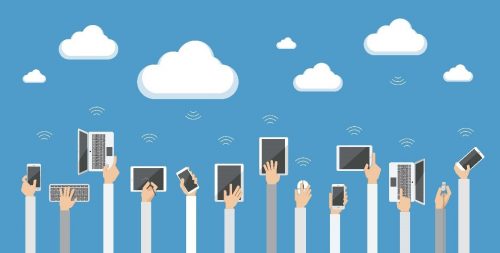The goal of article is to give you an insight into cloud PMS systems. It will enable you to learn more about these powerful software solutions, as well as to choose the right option for your business requirements. Read on to find out how implementing cloud hotel PMS can advance your business.
PMS, a hotel property management software system, was traditionally defined as a platform which enables hotels to manage their front-office requirements such as billing, room assignment, booking reservations, and all the other time-consuming spreadsheet-related processes.
However, this technology has evolved significantly over the years and its services now cover more than just front desk processes. Cloud hotel PMS is now considered to be a critical business solution, enabling hotel staff to deliver a smooth guest experience.
In this article, you can find out more about cloud property management software, its advantages and how to choose the best option.
Cloud vs. on-premises
Cloud-based solutions are offered on a SaaS (software as a service) basis. Using cloud hotel software doesn’t require hosting, maintaining or upgrading a server. Everything you need is a stable internet connection, and you will be able to access all of your data in real time, from any kind of a device, anywhere, anytime.
Not only are cloud options much more convenient and cost-effective than the on-premises solutions, but they are also more secure, as security vulnerabilities and risks are significantly reduced when running applications via the internet.
Enterprise grade servers ensure that there are adequate firewalls, SSL, multiple levels of authentication, data encryption, intruder alerts and real-time data backup across regions to ensure business continuity.
An intuitive UI and simple work-flows with complex back-ends ensure that the learning curve is smooth. The web-based design of cloud hotel software decreases the need for employee training – every member of the staff who has at least some knowledge about the internet will find it easy and intuitive.
Some other benefits of cloud solutions also include:
- Flexibility – Cloud-based software systems can be programmed automatically to adjust to new features and updates. The interface can be customized, allowing your workers to choose any features that might seem useful.
- Affordability – While on-premises solutions require costly regular maintenance, cloud solutions don’t require any additional labor and hardware costs, making them much more affordable.
- Increase in ADR and RevPAR – With cloud hotel PMS, hotels are able to manage rates and allocation of rooms to different distribution channels with a goal to help maximize rates, occupancy and revenue.
- Integrations – Cloud-based software allows better and quicker integrations with other apps. Therefore, with cloud PMS, more services can be used or availed by the hotel.
Cloud hotel PMS advantages
The guest experience involves more than just choosing a travel destination and the hotel to stay in – it includes booking interactions, engagement with the hotel staff, in-room experience and giving feedback on social media platforms.
Because of this, hoteliers are now challenged with offering a seamless guest experience while maintaining an effective business. That is why many of them are deciding to implement cloud property management software in their daily operations, as it enables them to achieve the best possible results both in terms of their business and the experience the guest desire.
There are numerous benefits of these cloud-based systems, and we will focus on some of the most important ones:
- Better and faster communication: Automated confirmation letters, re-arrival information, recommendations and communication during the stay, and other channels of communication like SMS, chatbots and other communication mediums – these are all benefits you will experience.
- Improved check in/check out capabilities – Your staff will be able to check guests in or out, provide guest services and assign rooms whenever there is an internet connection available.
- Improved housekeeping efficiency – The efficiency of housekeeping can be improved significantly with instant updates received whenever a guest checks out of their room. This enables greater flexibility when it comes to the room management, and the identification of room-maintenance requirements, making sure the rooms are in perfect condition.
- Integrated systems – PMS systems enable you to connect financial processes and operations by making the best use of the prebuilt integrations to payment gateways, accounts payable, accounts receivable, property infrastructure devices, and hotel industry applications. In addition to integrating with payment gateways, consider using a comprehensive paystub to streamline financial documentation and payroll processing for your hotel staff
- Improved customer data management – These software solutions allow you to centralize all the customer data and thus improve the accuracy and quality of guest profiles. This contributes to you developing a deeper understanding of your customers’ buying patterns, in order to come up with better targeted services.
- Revenue management – These tools offer features for rate management for semi-automated and manual revenue management, and options for setting rates.
How to choose the best option?
After getting a clearer insight into how cloud hotel software can improve your business operations, it’s time to make the right decision, which is not always easy, considering that there is a vast number of vendors nowadays. This is why we will provide you with some elements you should focus on before making a purchase:
- Cost – It’s certainly important to have a system that will streamline your workflow, but the price plays an important role, too. Although cloud-based solutions are already quite affordable, you should take advantage of free trials nevertheless, to see which option suits your needs best.
- Integration – Your hotel PMS needs to be able to integrate with the different systems that you are using. For instance, it is important that your PMS has the ability to connect with a Channel Manager. Integration is of a crucial importance, as any system that you are using specializes in its own field of work.
- Features – You need to make sure that the check in/check out process is simple, that reservations are displayed well, and that the system can store all of the guest information. Except for these, it’s important that your cloud PMS can provide reporting and analytics.
- Set up time – You should go for a solution that is intuitive to use and simple to set up, as it will make the transition to the new system painless for you and your employees. The majority of cloud PMS systems excel at this, as they don’t require any complex downloads.
- Support and training – You should always choose a cloud hotel software system that offers 24/7 support, meaning that any of the problems you may encounter can be solved in a timely manner. Moreover, your system should provide ongoing training, so that you and your employees don’t have a hard time when first starting to use the software. Support and training are also valuable for when you need to add some new features.
- Innovations – It is always important to check the future roadmap of to see what’s cooking in the PMS kitchen. New features and new innovations are what drives this market forward.
To sum up, cloud property hotel management software is simply a must in today’s hospitality industry. If you want to stay ahead of your competitors, provide your guests with a high quality service and increase your profits, cloud-based PMS is an irreplaceable tool for you.
Author Bio:-
Deepak is responsible for marketing and positioning of “mycloud” platform and is a veteran in the hotel software industry with over 25 years’ experience giving him a strong understanding of the product requirements in the industry. He has very rare mix of working in operations of various hotels and chains for over 10 years.
Deepak has led the development and marketing of cloud based hospitality systems to meet the specific, business objectives of small and mid-size properties across the globe and has worked closely with a diverse group of hoteliers.




